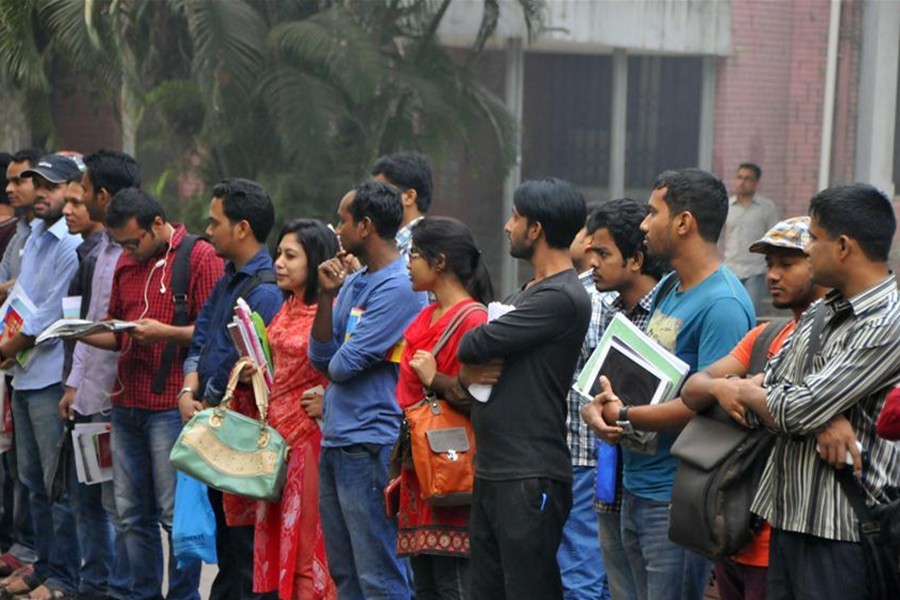Only 14 per cent of the annual development programme (ADP) of the proposed budget was directly youth-focused, a SANEM study revealed on Sunday.
It said considering the ADP of 22 ministries, it was found that the Ministry of Planning, and the Ministry of Post and Telecommunication had the least focus on youth: 5.0 per cent and almost zero per cent respectively.
The report was made public through a webinar - The National Budget FY 2021-22 from Youth Perspective - organised jointly by SANEM (South Asian Network on Economic Modelling) and ActionAid.
The experts, who participated in the webinar, also observed that the country's pathway towards sustainable economic recovery and social cohesion became vulnerable due to the pandemic's effect on the youth.
They recommended that the government policies should address the constraints of youth development to realise the demographic dividend, whose opportunity might get limited by 2040.
ActionAid Country Director Farah Kabir chaired the discussion, while SANEM Senior Research Director Prof Dr Sayema Haque Bidisha moderated it.
SANEM Senior Research Associate Ishrat Sharmin presented the keynote, which said 60 per cent of the ADP, fixed for 22 ministries, was non-youth-focused, while only 14 per cent was directly targeted at them.
The youth could get indirect help from 26 per cent of the ADP of the ministries.
The study said only 44 per cent of the youth population of working age were in labour market even in the pre-pandemic period, while 29.8 per cent of the total youth population were NEET (Not in Education, Employment, and Training). Among the 21-29 years old, the rate of NEET was around 36 per cent.
The study pointed out that youth unemployment rate was 10.6 per cent, which was much higher than the national unemployment rate of 4.2 per cent.
Meanwhile, 89 per cent of the total employed youth were engaged in informal sectors. Female labour force participation rate was stagnant at around 36 per cent.
The report noted that the pandemic-induced crisis largely affected education, employment and income, health, poverty and social safety net as well as caused surge in gender-based violence.
The study also revealed that at national level, only 22 per cent participated regularly in online classes. In the pre-Covid period, the families of 8.4 million students were below the poverty line.
The SANEM report said with 25 per cent income shock, additional 19 per cent families of the university students would be new poor.
It also pointed out that opening of educational institutions was conditional to vaccination, which would take more time as per the rate mentioned in the budget speech (0.25 million per month).
Some 57.7 per cent of the youngsters never availed any digital device for educational purposes.
Level of Covid-19 infection among the young people, aged 21-30, in Bangladesh was relatively higher at 27.1 per cent as of April 21.
Some 79.7 per cent of the self-employed youths reported decline in profit during the pandemic, and 57.4 per cent of the wage-employed reported decline in their wages, noted the SANEM study.
It recommended the government's realisation of 'policy framework' for apprenticeship, and opined that the youths involved in informal sectors should be given unemployment benefit.
Allocation for health and education sectors should be increased notably, mentioned the report. It also advocated easier access to stimulus packages for the youths involved in SME sector.
SANEM also suggested removal of tax on private educational institutes as well as adopting participatory approach of intersectional youths in policymaking process.
Dr Bidisha emphasised updated data and research to assess impact of the pandemic on the youth along with evidence-based policy-making.
She sought clear roadmap of poverty reduction, employment generation and inequality reduction.
She also recommended rigorous monitoring and evaluation of the stimulus packages.
Lawmaker Nahim Razzaq pointed out that the youths were still out of vaccination.
He said they should be vaccinated soon, which was obligatory now for economic recovery.
Md Hasanul Islam, Additional Secretary - Secondary and Higher Education Division, Mohammad Ismail, Additional Secretary - Ministry of Social Welfare, Dr Nashid Rizwana Monir, Deputy Secretary (Research and Policy) - Ministry of Expatriates' Welfare and Overseas Employment, Selim Raihan, Executive Director - SANEM, and Farzeen Ferdous Alam, Chairman - Oggro Ventures, among others, also spoke on the occasion.


